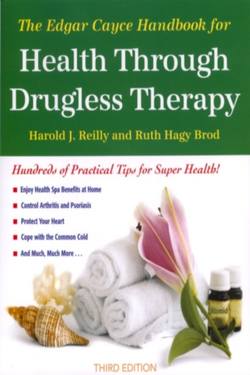Читать книгу The Edgar Cayce Handbook for Health Through Drugless Therapy - Harold J. Reilly - Страница 18
На сайте Литреса книга снята с продажи.
Assimilation
ОглавлениеLet us first consider assimilation. Cayce was far ahead of his time in understanding the importance of nutrition in the cause, cure, and prevention of disease:
There should be a warning to ALL bodies [with respect to assimilations and eliminations] . . . for would the assimilations and the eliminations be kept nearer NORMAL in the human family, the days might be extended to whatever period as was desired; for the system is builded by the assimilations of that it takes within, and is able to bring resuscitation so long as the eliminations do not hinder. [Italics added.] (311-4)
In the field of diet and nutrition, Cayce has proven to be as good a prophet as he was in other more glamorous and publicized ways. Current scientific research in biology and biochemistry have confirmed the essential wisdom of many of his theories. Unfortunately, medical practice still has not caught up with current research.
Cayce was concerned with food and drink, the combinations in which they were ingested, and their chemical interaction in the digestive processes; how and where food was grown and reached the table; cooking methods to preserve nutrients; and the condition of the emotions, mind, and spirit at mealtime. He also understood the differences among diet, nutrition, and assimilation. Diet is an outline of what to eat; nutrition is the study of what happens to food in the body after you swallow it; and assimilation, as he used it, is the individual’s capacity to utilize the food and the body’s performance of the complicated metabolic processes of digestion and elimination of indigestible material.
While many factors are involved, your nutrition has a great effect on your personality—on whether you are Caspar or Millie Milquetoast, Superman, or Glamour Gloria.
What happens to the food after you swallow it (assimilation) depends to a large extent on the other three ingredients of the Cayce CARE package—circulation, relaxation, and elimination.
Over the years, I have treated many women and some men who developed osteoporosis in later life. Osteoporosis is a disease involving thinning of the bones, which become porous and decalcified. Many of these patients were milk drinkers all their lives and otherwise followed a good diet, but at some point—usually, for women, after menopause—they lost their ability to absorb calcium. In these cases, many have been helped by a calcium-rich diet accompanied by daily exercise and massage. The increased circulation helps them absorb the calcium. Exercise and exercise equivalents like massage and manipulation, which stimulate circulation, play a vital role in our assimilation of food, a subject that we will go into in great detail in later chapters. Cayce even specified certain exercises to be performed to stimulate assimilation (see Chapter 7).
We all recognize how important relaxation is to digestion. If we eat when we are tired, angry, excited, or under stress or other emotion, the most nutritious food will give us indigestion, and if we make a habit of it, ultimately an ulcer. Too much food, eaten too rapidly, has killed many people. I always told my clients at the institute, “An excellent way to become a widow is to serve your husband a good, well-balanced meal, well cooked and attractively served, and then argue with him or nag him while he is eating.”
I would tell my many men patrons, “Don’t take your business out to lunch with you. It makes a very bad companion and will give you an ulcer. And never take it to dinner—it could give the whole family ulcers or a divorce.”
In the field of diet and nutrition, Cayce has proven to be as good a prophet as he was in other more glamorous and publicized ways. Current scientific research in biology and biochemistry have confirmed the essential wisdom of many of his theories. Unfortunately, medical practice still has not caught up with current research. —H.J.R.
The Cayce CARE Principle
Circulation
Assimilation
Relaxation
Elimination
(Q) Why should there be difficulties with the digestion?
(A) A great many things that are easily digested, if taken when the body is angry, will be hard to digest. This doesn’t matter whether [one is] a baby or 105. At any age it produces poison to eat when angry, as it does with most everything else attempted to be done under such disturbances. (3172—2)
